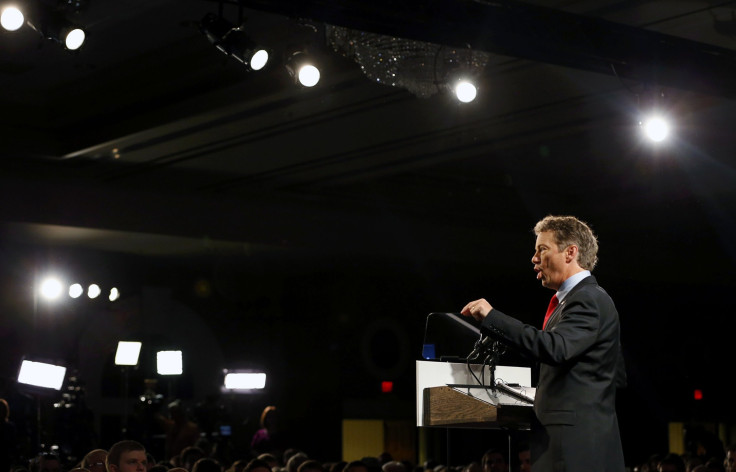Election 2016: Rand Paul Criticizes George Bush And Barack Obama; Republicans And Democrats Fire Back

WASHINGTON -- Rand Paul is running -- against everyone. Democrats, Republicans, President Barack Obama and President George W. Bush. He’s a fan of neither the National Security Agency (NSA) nor the IRS. And while he’s ready to criticize everyone, everyone is ready to return the favor.
Paul started his campaign announcement speech Tuesday with a swipe at “Washington,” but unlike many of his Republican colleagues, he didn’t zero in on Democrats. There was no mention of “Obamacare,” no pledge to repeal the president’s health care law. He mentioned Obama by name only three times.
“We have come to take our country back from the special interests that use Washington as their personal piggy bank, the special interests that are more concerned with their personal welfare than the general welfare,” Paul began. “The Washington machine that gobbles up our freedoms and invades every nook and cranny of our lives must be stopped.”
The Kentucky senator then lumped George W. Bush in with Obama -- a surprising stance for a Republican candidate. “It seems to me that both parties and the entire political system are to blame,” Paul said. “Big government and debt doubled under a Republican administration. And it’s now tripling under Barack Obama’s watch. President Obama is on course to add more debt than all of the previous presidents combined.”
Paul also broke with his party in defending negotiations with Iran concerning the country's nuclear program. “Everyone needs to realize that negotiations are not inherently bad,” Paul said. “Trust-but-verify is required in any negotiation, but then our goal always should be and always is peace, not war.”
One of Paul's strongest criticisms was directed at the NSA and its domestic surveillance programs. Again, Paul criticized President Bush without using his name, referring to his creation of surveillance programs in the aftermath of the Sept. 11 attacks. “The president created this vast dragnet by executive order,” Paul said. “And as president on day 1, I will immediately end this unconstitutional surveillance.”
But Paul also echoed a popular Republican complaint about perceived IRS targeting of tea party groups. “I see an America with a restrained IRS that cannot target, cannot harass American citizens for their political or religious beliefs,” he said in describing his hoped-for future.
Paul’s willingness to criticize everyone in Washington means he’s taking pushback from both sides of the political aisle.
GOP Sen. Lindsey Graham has become a vocal opponent of Paul’s foreign policy positions. Graham said last weekend that of all the Republicans, Paul would produce a bad deal with Iran if he had negotiated it.
A group critical of the Iran deal quickly launched an ad attacking Paul, recycling a video it has been using for weeks to criticize the possibility of an agreement with Iran. The ad calls Paul “dangerous” and shows an explosion at the conclusion.
Democrats, meanwhile, were happy to pile on. American Bridge, a liberal super PAC, published a “Paul Off the Wall” series of shareable criticisms of the Kentucky senator.
“Paul may be ready to race to the right with the rest of the Republican field, but he will have trouble defending his past positions,” the group wrote. “Rand has a history of taking on views that are bizarre and even dangerous, such as supporting the end of all foreign aid to Israel and pushing for the total privatization of Medicare."
Unquestioning support for the current Israeli government has become a litmus test for Republican candidates, who are trying to use Obama's evident dislike of Prime Minister Netanyahu to pull Jewish voters away from the Democratic party. Paul, who is less isolationist than his father but still no fan of foreign involvement, may find his foreign policy views costing him with voters in both parties. But the fact that his views don't fit neatly into any one partisan pigeonhole may also be his strongest asset. That's a point he started making from his first speech as a presidential candidate.
© Copyright IBTimes 2024. All rights reserved.












